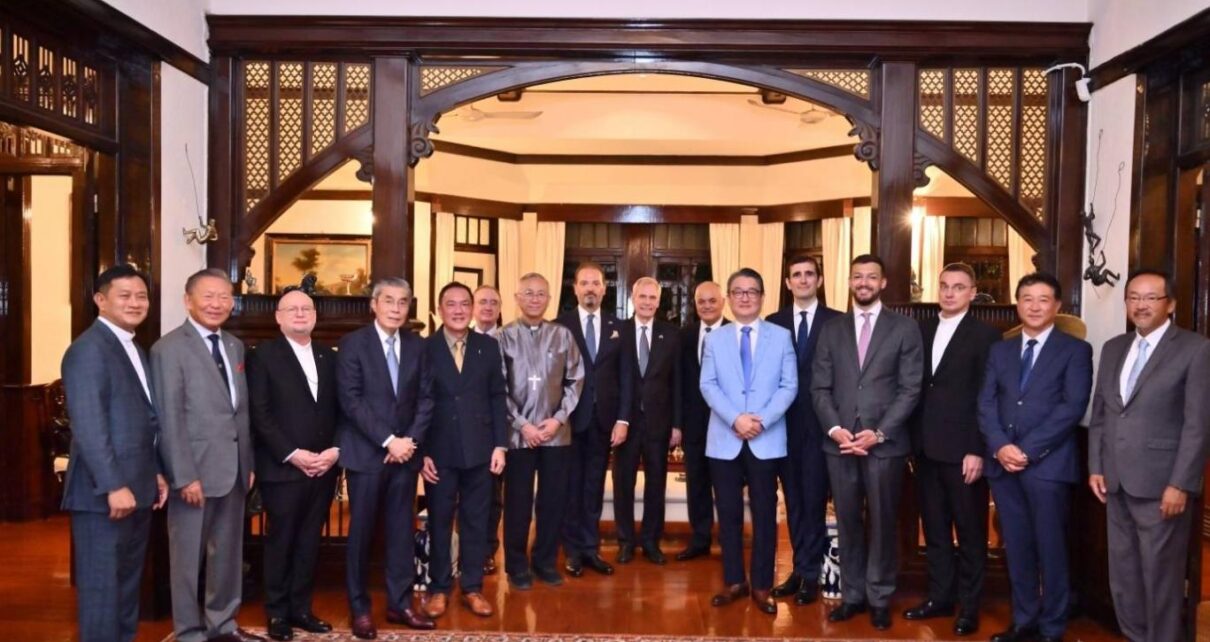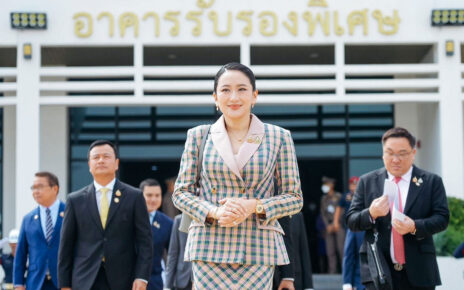Two of Italy’s highest civilian honours were conferred on two distinguished Thai figures in Bangkok, recognizing their exceptional contributions to international relations, philanthropy, and the deepening of cultural and economic ties between Italy and Thailand. The Italian Embassy in Bangkok hosted a formal reception to present the decorations to Khunying Patama Leeswadtrakul and Dr Somsak Leeswadtrakul, underscoring a shared commitment to cross-cultural dialogue, sport diplomacy, and social advancement. The ceremony brought together ambassadors, senior diplomats, business leaders, and leading figures from Thai society to celebrate the couple’s enduring efforts to strengthen bilateral relations and promote international cooperation across multiple sectors.
Ceremony and Honorees
The reception at the Italian Embassy in Bangkok epitomized the long-standing friendship between Italy and Thailand, spotlighting the honorees’ multifaceted contributions to public life, culture, and commerce. Khunying Patama Leeswadtrakul, a prominent Thai public figure with a broad portfolio of leadership roles, and Dr Somsak Leeswadtrakul, a leading industrialist and philanthropist, were awarded two of Italy’s most prestigious honours: the Commendatore dell’Ordine al Merito della Repubblica Italiana (Commander of the Order of Merit of the Italian Republic – OMRI) and the Commendatore dell’Ordine della Stella d’Italia (Commander of the Order of the Star of Italy – OSI). The OMRI is Italy’s highest-ranking civilian honour, bestowed on individuals who have rendered outstanding service in fields such as literature, the arts, economy, public service, and social and humanitarian activities. The OSI, by contrast, is reserved for foreign nationals who have made significant contributions to promoting friendly relations and cooperation with Italy. The distinction awarded to Khunying Patama underscores her influence not only in Thai cultural and sports circles but also in promoting international collaboration and cultural diplomacy that transcends borders.
The evening’s ceremony featured a series of formal presentations and exchanges that highlighted the honorees’ long-standing efforts to foster mutual understanding and collaboration. Tala Dionisi, the wife of the Italian ambassador, participated in presenting Khunying Patama’s OMRI decoration, while the Italian Ambassador to Thailand, His Excellency Paolo Dionisi, presented Dr Somsak with the OSI decoration. The ambassador’s remarks during the event paid tribute to the honorees’ lifelong dedication to excellence and cross-cultural dialogue, noting how their work has helped build bridges between the two countries through sport, culture, business, and philanthropy.
Attendees at the reception included a spectrum of international and Thai dignitaries, emphasizing the broad impact of the honorees’ work. US Ambassador Robert Godec joined in offering congratulations, alongside Japan’s Ambassador to Thailand, Otaka Masato, who presented a bouquet to the couple. Nalinee Taveesin, president of Thailand Trade Representatives, also attended, reflecting the strong economic dimension of the ceremony and the broader ties between Italy and Thailand in trade, industry, and investment. The presence of foreign ambassadors underscored the ceremony’s diplomatic significance and its role in reinforcing a shared network of international cooperation.
In receiving their decorations, Khunying Patama and Dr Somsak reaffirmed their commitment to fostering international goodwill, cultural understanding, and sustainable development. Khunying Patama delivered a heartfelt address in which she expressed deep gratitude for the recognition and reaffirmed her dedication to strengthening the enduring bond between Italy and Thailand. She highlighted the importance of sport and culture as vehicles for peace and cross-cultural understanding, tracing her passion for sport diplomacy to her early education at St. Francis Xavier Convent School. She also noted her role as Chair of the IOC Culture and Heritage Commission and pledged continued support for initiatives linked to Milano Cortina 2026, which she described as a celebration of Italy’s beauty, spirit, and rich Olympic tradition.
Dr Somsak’s remarks centered on the Thai steel industry’s development and the crucial role his collaborations with Italian businesses have played in advancing regional industry and cross-border investment. The ambassador who presided over the ceremony commented on how Somsak’s endeavors have helped integrate Thai economic activity with Italian enterprise, particularly through the facilitation of projects led by the Italian industrial group Danieli. The ambassador’s observations painted a portrait of a business leader who has built an empire spanning the steel sector—from downstream to upstream operations—while expanding into construction, real estate, and property development. The ceremony underscored that Somsak’s influence extended beyond economics: his charitable activities extended to the Catholic community in Thailand and to other religious groups, reflecting a broad-based commitment to social progress and humanitarian aid within Thai society and beyond.
Within the ceremony, several images captured the moment of recognition: Khunying Patama smiling after receiving the OMRI decoration, Somsak accepting the OSI decoration, and a series of group photographs that included regional and international diplomats, business leaders, and cultural figures. The event also highlighted the couple’s shared emphasis on people-to-people connections as a key driver of international relations, a point emphasized by the ambassador in his remarks.
The overall atmosphere conveyed a sense of reverence for the honorees’ achievements and a recognition that their leadership has helped shape a collaborative future between Italy and Thailand. The ambassador’s remarks framed the awards as a testament to the enduring friendship between the two nations, rooted in mutual respect, shared values, and a common commitment to promoting peaceful, productive relations across diverse domains.
Supporting notes on the ceremony’s meaning
The ceremony reflected a broader ethos of using high-level recognitions to celebrate cross-border collaboration. In addition to the formal presentations, the event provided a platform for leaders from both countries to reflect on how sport, culture, industry, and philanthropy can intersect to create sustainable progress. The honorees’ backgrounds illustrate a fusion of public service, cultural leadership, and entrepreneurial achievement that embodies the strategies commonly pursued in international diplomacy: leveraging influential individuals to deepen ties, expand dialogue, and generate opportunities for joint initiatives. The ceremony’s design—featuring a blend of formal honours, ceremonial traditions, and contemporary diplomacy—spoke to a shared understanding that bilateral relationships flourish when national narratives converge through people who act as bridges between cultures and economies.
The Honors: OMRI and OSI — Significance and Context
The Commendatore dell’Ordine al Merito della Repubblica Italiana (OMRI) is Italy’s premier civilian decoration, conferred on individuals who have made extraordinary contributions in literature, arts, economy, public service, and social or humanitarian causes. It serves as a formal recognition of long-standing service and impact on Italy’s image and interests, including fostering international cooperation and cultural exchange. The Awards Committee emphasizes the recipient’s role in strengthening ties with Italy or in promoting Italian values and collaboration abroad. The OMRI carries a message of prestige and admiration from the Italian Republic, signaling to both domestic and international audiences that the recipient’s work aligns with Italy’s broader diplomatic, cultural, and economic objectives.
The Commendatore dell’Ordine della Stella d’Italia (OSI) is designated for foreign nationals who have made significant contributions to promoting friendly relations and cooperation with Italy. This honor highlights the recipient’s role in creating and sustaining dialogue, business partnerships, cultural exchanges, and mutual understanding between Italy and other nations. The OSI recognizes not only achievement in a given field but also the ambassadorial role played by the honoree in advancing bilateral interests in a manner that resonates within Italy’s foreign policy priorities.
When these orders are awarded, the ceremony typically emphasizes the recipient’s impact on both countries’ social and economic landscapes. The selection criteria focus on a synthesis of leadership, philanthropy, and tangible contributions to cultural diplomacy and international cooperation. In the Bangkok ceremony, the choice to honor Khunying Patama with OMRI and Dr Somsak with OSI aligns with the two individuals’ public personas: Patama’s leadership positions in Thai sports, culture, and public life, and Somsak’s influence in the Thai industrial sector and his collaborations with Italian firms. The awards hence symbolize the convergence of Thai excellence with Italian appreciation for cross-border achievement, reinforcing a narrative of shared progress and mutual respect.
Profiles of the Recipients
Khunying Patama Leeswadtrakul — A Leader in Sports, Culture, and Public Service
Khunying Patama Leeswadtrakul’s profile reads as a tapestry of leadership across sports governance, cultural promotion, and public philanthropy. As a member of the International Olympic Committee (IOC), she participates in the global governance of sport and the promotion of Olympic values. Her presidency of the Badminton World Federation (BWF) places her at the apex of a major international sport, steering development, governance, and sport diplomacy within a global community of athletes, federations, and national Olympic committees. Her roles extend to the Chairpersonship of the Center for Morality Promotion (Public Organization) and to leadership positions within cultural institutions, as well as in the cultural promotion dialogue that underpins Thailand’s soft power.
Patama’s appointment to the Chair of the Board of the Thailand Philharmonic Orchestra (TPO) highlights her commitment to integrating culture with public life and economic development. The orchestra stands as a cultural beacon within Thailand, offering artistic excellence and serving as a bridge for cross-cultural exchange between Thailand and international partners. In addition to her cultural leadership, Patama’s philanthropic endeavors—spanning numerous charitable causes within Thailand and internationally—emphasize her broader mission to elevate social welfare and inclusive advancement across communities. Her influence has extended into the realm of sport diplomacy, where she emphasizes the role of sport in fostering peace, mutual understanding, and international cooperation.
Patama’s public work also intersects with economic and international dimensions. Her involvement in activities that support Italy’s bid to host Milano Cortina 2026 underscores the strategic value of cultural and sporting diplomacy in linking national brands and international audiences. In her capacity as a leader who blends economic vision with political acumen, she has consistently underscored the importance of people-to-people connections that can transcend cultural differences and borders. The ambassador’s remarks framed Patama as someone who has left a vibrant legacy for Thailand, one that continues to inspire new generations to engage in cross-cultural dialogue and collaborative initiatives.
Her early education at St. Francis Xavier Convent School was highlighted as a foundation for her philosophy that sport can be a powerful instrument for global harmony and understanding. As the IOC Culture and Heritage Commission chair, Patama has signaled her intent to advance cultural programs and heritage initiatives that align with Italy’s own cultural diplomacy objectives. Her remarks at the ceremony suggested a forward-looking commitment to leveraging sport as a unifying platform for a more peaceful and interconnected world. The recognition through OMRI thus served as a formal acknowledgment of a career characterized by sustained excellence, social impact, and a dedication to bridging cultures through sport, culture, and education.
Dr Somsak Leeswadtrakul — A Steel Magnate with a Global Footprint
Dr Somsak Leeswadtrakul stands as a towering figure in Thailand’s steel industry and an influential business leader with a broad portfolio spanning construction, real estate, and property development. His leadership and entrepreneurial achievements have positioned him as one of Southeast Asia’s notable industrial figures, with a business network that extends into collaborations with international players, including Italian industrial groups. The recognition of his work with the OSI highlights his role in promoting friendly relations and cooperation with Italy through economic exchange, joint ventures, and cross-border investment projects.
Somsak’s influence on Thailand’s steel sector has included the facilitation of Italian-led projects, particularly those involving Danieli, a prominent Italian company known for its steelmaking equipment and industrial solutions. His ability to connect Thai industry with Italian technology and expertise has been described by the embassy’s representatives as a substantial contribution to regional economic integration. Beyond his industrial achievements, Somsak’s charitable activities extend across religious communities, including support within the Catholic community in Thailand and outreach to other faith groups. This philanthropic dimension of his life is presented as a testament to his commitment to social progress and inclusive development, reinforcing the idea that business leadership can harmonize economic success with social responsibility.
Although Somsak is described as maintaining a low public profile, the ambassador highlighted his generosity and sustained support for various charitable causes, illustrating how his influence translates into concrete acts of giving and community enhancement. The ambassador’s remarks emphasized that Somsak embodies a vision and skillset that illustrate the importance of cultivating both economic and social ties in international relations. The narrative presented by the awards ceremony positioned Somsak as an exemplar of how private sector leadership can contribute to national growth while strengthening bilateral ties with Italy through trade, investment, and corporate collaboration.
Italy–Thailand Relations: A Multi-Dimensional Partnership
The ceremony and the honours reflect the broader arc of Italy–Thailand relations, which span political, cultural, economic, and people-to-people dimensions. The event serves as a microcosm of a diplomatic relationship that benefits from sustained collaboration across sectors. The appreciation expressed by Italian and Thai officials highlighted how the two countries have cultivated a dynamic exchange in culture, sport, business, and humanitarian efforts. The cross-border dialogue is anchored not only in formal diplomacy but also in the everyday interactions of cultural institutions, sports bodies, and commercial enterprises, where individuals like Patama and Somsak act as catalysts for deeper cooperation.
A key element of this partnership is sport diplomacy, a field in which Patama has played a central role. Her work with the IOC and the BWF underscores the role of international sporting bodies in fostering peaceful engagement and mutual understanding among diverse communities. The Milano Cortina 2026 Winter Olympics and Paralympics, for which Patama offered crucial support, symbolize how sports can serve as a platform for cultural exchange and economic activity, while also illustrating how host-nation events can strengthen international goodwill and bilateral cooperation. This aligns with Italy’s long-standing tradition of using sport and culture to enhance diplomatic ties, a practice that has tangible benefits in tourism, education, and investment.
The awards also signal the importance of people-to-people connections in diplomacy. The ambassador’s praise of Patama and Somsak points to a recognition that individual leadership, philanthropy, and cultural stewardship are essential components of any robust bilateral relationship. The ceremony, attended by both Thai and international figures, demonstrated a shared understanding that trust and collaboration are built not only through official channels but through sustained engagement at the level of civil society, business communities, and cultural institutions. The presence of ambassadors from the United States and Japan, among others, underscored the ceremony’s regional significance and its resonance within the broader framework of international relations in Southeast Asia.
Reactions, Reflections, and the Road Ahead
The occasion drew remarks that extended beyond the two honorees, touching on the broader implications for Italy–Thailand cooperation. The Italian ambassador’s reflection on Patama’s legacy emphasized the value of ongoing cross-cultural dialogue, the role of sport and culture in shaping national narratives, and the importance of maintaining momentum in bilateral collaboration. The ambassador’s positive appraisal of Patama’s energy and achievements—despite the passage of time and a record of successes—conveys a message about the enduring power of sustained leadership to influence a nation’s international standing and its relationships abroad.
Patama’s own response framed the recognition as a moment of humility and responsibility. She highlighted the importance of sport diplomacy and the role that sport can play in bridging cultural divides and fostering mutual respect. Her remarks tied the award to her broader commitment to the Olympic Movement and to using sport as a catalyst for peace and cultural exchange. She spoke of her family, colleagues, and supporters as integral to the journey, and she publicly reaffirmed her pledge to continue advancing initiatives aligned with Milano Cortina 2026 and other cultural and athletic programs that strengthen Thailand–Italy ties.
Somsak’s remarks emphasized the Thai business community’s connection to Italian industry and the potential for ongoing collaboration in construction, steel production, and real estate development. The dialogue around Danieli projects highlighted the synergy between Italian technology and Thai market opportunities, signaling a robust avenue for future joint ventures that can benefit both economies. The ambassador’s praise of Somsak’s generosity and his contributions to social causes reinforced the idea that economic leadership can be accompanied by a sense of social responsibility, an attribute that strengthens public trust and international goodwill.
Legacy, Impact, and Continuing Collaboration
The ceremony and the honors signal a continued trajectory for Italy–Thailand engagement, with Patama and Somsak representing a model of leadership that integrates public influence, corporate responsibility, cultural stewardship, and philanthropic activity. The recognition of their contributions serves to elevate the profile of cross-border collaboration and to create a narrative in which sport, culture, and industry are interwoven into a durable framework for mutual development. The events around Milano Cortina 2026, and Patama’s role in supporting this initiative, illustrate how the two countries can leverage shared interests in sport and culture to advance broader diplomatic goals.
Patama’s stated commitment to “strengthening the enduring bond between Italy and Thailand” resonates with the values of inclusive development and international friendliness. Her focus on sport’s capacity to foster peace, education, and cross-cultural understanding aligns with a global trend toward diplomacy through non-traditional channels, where athletes, artists, and business leaders act as ambassadors for peace and cooperation. The acknowledgment of her family’s role and the mention of her educational background reinforce the idea that a long-term, holistic approach to leadership—encompassing education, culture, and sport—can yield enduring benefits for bilateral relations.
Somsak’s reaffirmation of his dedication to social progress and cultural ties complements Patama’s emphasis on sport and culture, illustrating a shared vision for a balanced, mutually beneficial relationship between Italy and Thailand. Their joint emphasis on sustainable development and international goodwill signals a commitment to responsible growth that respects cultural diversity while harnessing economic potential. In this light, the awards can be viewed not only as recognitions of individual achievements but also as strategic signals about the future direction of bilateral cooperation in trade, industry, culture, and humanitarian outreach.
Event Highlights and Notable Moments
- The ceremony featured formal recognitions by the Italian ambassador and the presence of various international diplomats, reinforcing the ceremony’s diplomatic significance.
- Khunying Patama’s address centered on gratitude, the value of sport diplomacy, and the enduring bond between Italy and Thailand.
- Dr Somsak’s contributions to Thai industry and his collaborations with Italian firms were highlighted as catalysts for regional economic integration.
- The reception underscored the importance of people-to-people ties, cross-cultural dialogue, and philanthropic leadership as essential elements of modern diplomacy.
Conclusion
The conferral of OMRI and OSI on Khunying Patama Leeswadtrakul and Dr Somsak Leeswadtrakul marks a milestone in Italy–Thailand relations, celebrating leadership that bridges culture, sport, business, and humanitarian work. The ceremony at the Italian Embassy in Bangkok highlighted how individual contributions can amplify bilateral ties, foster cross-cultural understanding, and advance shared goals in sustainable development, cultural promotion, and international cooperation. Patama’s and Somsak’s exemplary work across diverse domains—sport governance, cultural stewardship, industrial leadership, and charitable giving—demonstrates the enduring value of a partnership rooted in mutual respect, open exchange, and a commitment to forging a more connected, peaceful world through shared human endeavor.
Their recognitions reinforce the idea that diplomacy in the 21st century extends beyond formal state-to-state channels to include influential figures who mobilize resources, ideas, and networks to advance common interests. As Italy and Thailand look toward a future shaped by cultural exchange, economic collaboration, and sport-driven diplomacy, the legacy of Patama and Somsak will likely continue to inspire broader initiatives that bring people together across borders for the betterment of society at large.



